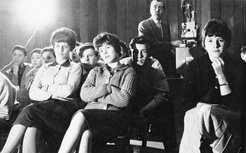Emotions and Knowledge in Health Education Films and the Shaping of the Modern Subject in the 20th Century
(Projektlaufzeit 2010-2019)

Science has long conducted research on emotions and has significantly shaped how they are perceived. Moreover, visual media, and film in particular, substantially changed the way knowledge and emotions were produced, circulated, and received in the 20th century. Thus, the project examines the relationship between emotions and knowledge in both East and West German sex education films and their close ties to film production in France and the United States.
Taking a discursive approach, the project shows how experts in medicine, psychology, pedagogy and film theory constructed the notion of “endangered” audiences who could be reached by triggering certain emotions: fear for soldiers in World War I; shame and disgust for the general public in the interwar period; fear and trust for soldiers in World War II; and empathy and humor for “youth” in the postwar era. Important is the insight that the identification of certain audiences with particular emotions has come to shape our contemporary understanding of the transfer of knowledge through the media and our understanding of the relationship between perception, cognition, and (moving) emotions.
The study illustrates how sex education films were intentionally developed as an “emotional engineering technique.”
Based on a filmic dispositive approach it explores the international and transnational media alliances and visual iconography that informed the production of sex education films in Germany, and details the ways films used visual devices and novel film techniques to develop “scientifically emotionalized moral tales” with the aim of preventing the spread of disease and encouraging certain sexual practices and precautions. In doing so, these films helped shape contemporary interpretations of the human subject as a “preventative self” and reinforced practices of self-optimization. For this reason, the study also treats recipients’ reactions to and rejections of this advice. Finally, the project details the ways psychologists and sociologists used these films to study in experiments how emotions and knowledge are transferred and to better understand the conditions under which (health) behaviors and attitudes can be addressed and changed.
Combining different perspectives and methodological approaches, the project thus shows how the different deployment of films as a new educational practice worked and how the history of these films can be understood as a negotiation of the modern human subject in different political systems (Weimar democracy, National Socialism, Allied Occupation, West Germany and the GDR). It ultimately demonstrates that the historical construction of an emotional but “paradoxical self” was strongly shaped by the sciences and by international exchanges.
